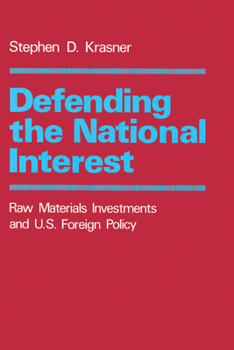Defending the National Interest: Raw Materials Investments and U.S. Foreign Policy
Select Format
Select Condition 
Book Overview
Stephen Krasner's assumption of a distinction between state and society is the root of his argument for the superiority of a statist interpretation of American foreign policy. Here he challenges the two dominant and rival interpretations of the relationship between state and society: interest group liberalism and Marxism. He contends that the state is an autonomous entity acting on behalf of the national interest, and that state behavior cannot...
Format:Paperback
Language:English
ISBN:0691021821
ISBN13:9780691021829
Release Date:November 1978
Publisher:Princeton University Press
Length:424 Pages
Weight:1.15 lbs.
Dimensions:1.0" x 6.0" x 9.2"
Customer Reviews
1 rating
Part of an important debate...
Published by Thriftbooks.com User , 23 years ago
In "Defending the National Interest," Krasner steps outside the normal IR (International Relations) debate about the definition of the national interest and instead defines the national interest empirically. For Krasner (pp.13), the national interest is "defined inductively as the preferences of American central decision-makers." For his cases, he considers the "decision-makers" to be the relevant officials in the White House and the State department. His historical case study method is particularly well suited to discovering the preferences of these decision makers, and he finds several interests that are pursued consistently over time. Krasner's case studies concern post-WWII U.S. foreign policy regarding raw materials acquisition, and he finds that the U.S. has acted consistently to protect key raw materials sources. In a chapter in his 1990 book, "The Power Elite and the State : How Policy Is Made in America," G. William Domhoff disputes Krasner's definition of the national interest and the origin of the raw materials policy that they both observe. I recommend both books, as the dialogue between the two scholars is really interesting. Both are a must for the aspiring political sociologist.






